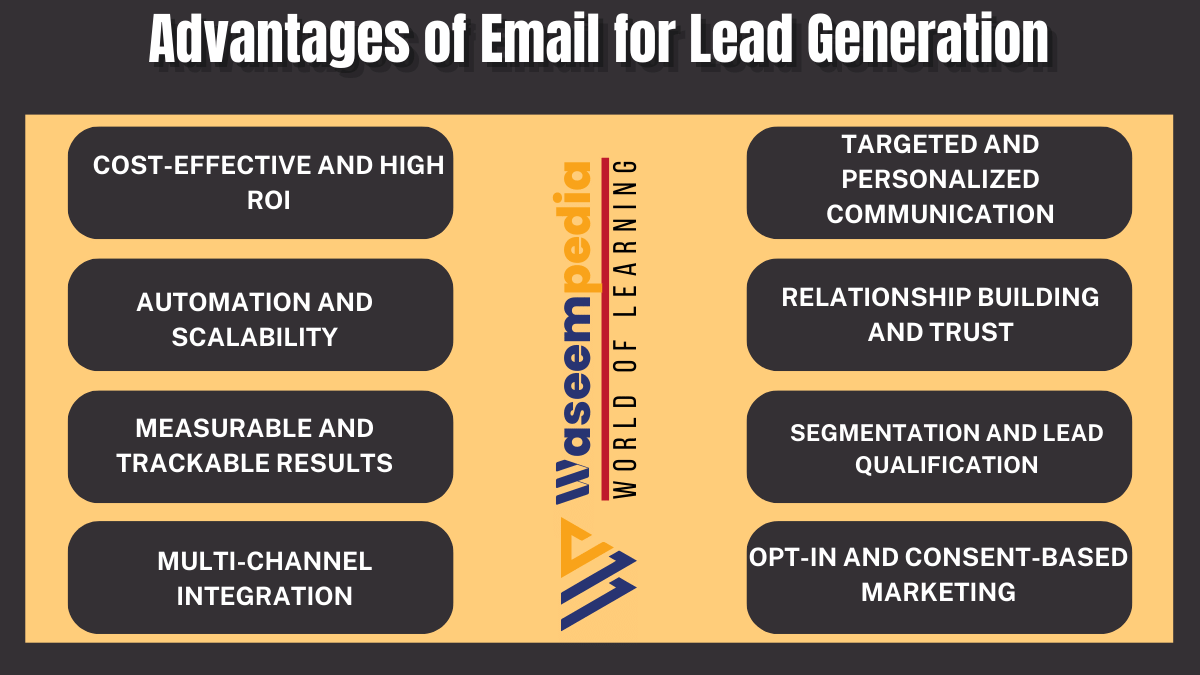Email offers numerous advantages for lead generation, including cost-effectiveness, targeted communication, automation, relationship building, and measurable results. By leveraging the power of email, businesses can reach their target audience, nurture leads, and increase their chances of converting leads into loyal customers.
Lead generation is a fundamental aspect of any business’s marketing strategy. It involves identifying and nurturing potential customers who have shown interest in a product or service. While there are various lead generation techniques, email marketing continues to be a powerful tool for acquiring and converting leads.

In this article, we will explore the advantages of using email for lead generation and how it can benefit businesses in reaching and engaging their target audience.
Email also provide the many facilities like Fundraising , File Sharing , Customer Support , Customer Retention and Business Communication etc.
Role of Email in Lead Generation
Email plays a vital role in lead generation by allowing businesses to establish direct communication with potential customers. It provides a platform for delivering targeted messages, building relationships, and nurturing leads through various stages of the sales funnel. The advantages of email make it a valuable tool for acquiring and converting leads effectively.

8 Advantages of Email for Lead Generation
8 Advantages of Email for Lead Generation are as following
1. Cost-Effective and High ROI
Email marketing is a cost-effective strategy for lead generation, particularly when compared to traditional advertising methods. With minimal production and distribution costs, businesses can reach a large audience at a relatively low cost per lead. Additionally, email marketing offers a high return on investment (ROI) as it enables businesses to generate leads and convert them into customers with minimal expenses.
2. Targeted and Personalized Communication
Email allows businesses to deliver targeted and personalized messages to their leads. By segmenting their email list based on specific criteria such as demographics, interests, or previous interactions, businesses can tailor their content to resonate with each segment. Personalized emails have higher open and click-through rates, leading to better engagement and increased chances of conversion.
3. Automation and Scalability
Email automation tools enable businesses to streamline their lead generation efforts. Automated email sequences can be set up to deliver a series of pre-determined messages to leads based on their behavior or actions.

This automation saves time and effort while ensuring consistent and timely communication. Businesses can scale their lead generation efforts by reaching a larger audience without requiring manual intervention for each lead.
4. Relationship Building and Trust
Email marketing is an effective channel for building relationships and establishing trust with leads. By consistently delivering valuable content and insights, businesses can position themselves as trusted industry experts.
Email allows for ongoing communication and nurturing, fostering a sense of familiarity and credibility among leads. Building trust is essential in lead generation as it increases the likelihood of leads progressing through the sales funnel.
5. Measurable and Trackable Results
Email marketing provides measurable and trackable results, allowing businesses to evaluate the effectiveness of their lead generation campaigns. Through email analytics, businesses can monitor metrics such as open rates, click-through rates, and conversion rates.
These insights provide valuable data for optimizing future campaigns, identifying areas of improvement, and making data-driven decisions to increase lead generation success.
6. Segmentation and Lead Qualification
Email segmentation enables businesses to categorize leads based on specific criteria and deliver targeted content accordingly.
By segmenting leads, businesses can qualify and prioritize them based on their level of engagement or readiness to make a purchase. This allows for more effective lead nurturing and increases the chances of converting leads into customers.
7. Multi-Channel Integration
Email can be seamlessly integrated with other marketing channels to enhance lead generation efforts. Businesses can use email as part of a multi-channel marketing strategy, combining it with social media, content marketing, or advertising campaigns. Integration allows for consistent messaging, cross-promotion, and increased touchpoints, which contribute to a more comprehensive lead generation approach.
8. Opt-in and Consent-Based Marketing
Email marketing operates on an opt-in and consent-based model, ensuring that businesses engage with leads who have shown genuine interest in their offerings.
Leads willingly provide their contact information and give permission to receive emails, indicating their willingness to engage with the business. This leads to higher-quality leads and a more receptive audience for lead generation efforts.

